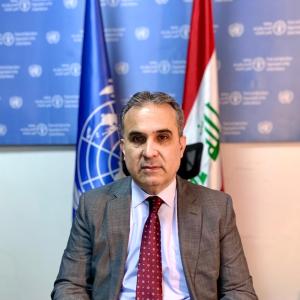FAO enhances veterinary capacity for clinical diagnosis and animal disease recognition in Iraq
14 November 2024
14 November 2024 – Erbil, Iraq - The Food and Agriculture Organization of the United Nations (FAO) in Iraq, in collaboration with Iraq’s Ministry of Agriculture (MoA), the Ministry of Agriculture and Water Resources (MoAWR-KRG), conducted 4 days comprehensive training workshop on "Clinical Diagnosis and Disease Recognition" in Erbil. This workshop, aimed to strengthen Iraq’s animal disease diagnosis, reporting, and surveillance systems.

The workshop is part of the FAO project titled "Strengthening Iraq Veterinary Legislation and Expanding Delivery of Animal Health Services and Disease Surveillance," funded by the United States Defense Threat Reduction Agency (DTRA). It featured rigorous training on the clinical diagnosis of priority animal diseases, differential diagnosis, and sample collection.
A total of 17 veterinary staff, including veterinarians from hospital dispensaries, epidemiology, and laboratory specialists, attended from targeted governorates, including Najaf, Sulaymaniyah, Diyala, and Missan.
Dr. Salah ElHajj Hassan, FAO Representative in Iraq, underscored the essential role of accurate, timely disease detection as a cornerstone for safeguarding both public and animal health across Iraq. "by equipping veterinary professionals with advanced clinical skills and real-time reporting tools like EMA-i and EMPRES-i+, Iraq can significantly mitigate the devastating effects of disease outbreaks on livestock and food security” Dr. ElHajj Hassan highlighted.
His address reinforced the importance of the One Health approach, connecting animal health with broader public health and environmental outcomes, and emphasized FAO's commitment to empowering Iraq’s veterinary sector to tackle health threats effectively and sustainably.
Throughout the structured four-day agenda, participants engaged in practical, hands-on sessions covering essential diseases such as Blue Tongue, Brucellosis, Tuberculosis, Anthrax, and PPR (Peste des Petits Ruminants). Sessions on Lumpy Skin Disease, Avian Influenza, and FMD (Foot-and-Mouth Disease) highlighted critical clinical symptoms and identification techniques. Led by the FAO national team and experts from veterinary colleges across Iraq, the training emphasized biosafety, biosecurity practices, and collaboration across government and syndicate organizations to ensure effective disease surveillance and response in Iraq.
This training strengthens Iraq’s ability to detect and respond to animal diseases that impact livestock and public health. The shared knowledge equips Iraq’s veterinary workforce to handle disease outbreaks effectively, promoting food security and supporting the One Health approach.

He started his career in 1984, as Senior Research Assistant in the Agricultural Research and Education Centre (AREC), American University of Beirut. From 1987 to 1991, he was Coordinator of the Student Training Programme, and also Agriculture and Horticultural Teacher for the Faculty of Agriculture, at the Lebanese University.
From 1991 to 1995, he worked as Agricultural Engineer at the Ministry of Agriculture, Bekaa Regional Office, Zahlah and was then assigned to the Agricultural Research Institute in the Tal Amara station, first as Head of the Crop Production Department and subsequently in charge of the Plant Protection Laboratory. From 2002 to 2006, he was Director of the Kfardane Research Station (Agricultural Research Institute). In 2008, he became Visiting Scientist at the International Maize and Wheat Improvement Centre (CIMMYT) and Coordinator of a project with the International Centre for Atomic Energy Agency, Vienna.
In 2010, he served as Advisor to the Minister for Agriculture of Lebanon. In 2011, he became President of the Pesticide Scientific Committee, Head of the Phytoplasma Committee and Director of the Agriculture and Rural Development Programme (ARDP) (EU-funded project). From 2010 to 2013, he represented Lebanon in negotiations with EU, Egypt, Jordan and Iraq. During his career, Mr Hajj Hassan also carried out a number of other functions. He represented the Lebanese Agricultural Research Institute (LARI) in several research programmes with the International Centre for Agricultural Research in the Dry Areas (ICARDA) and the American University of Beirut. He was Coordinator of the Mashreq/Maghreb project with ICARDA, representing Lebanon in the Steering Committee, as well as being the Head of the Sugar-beet Delivery and of the Wheat Delivery Committees. For a number of years, Mr Hajj Hassan worked for the preparation of FAO TCP projects and served as the National Director of a TCP project. He joined FAO in January 2014 as FAO Representative in Yemen. Mr Hajj Hassan succeeds Mr El Zubi as FAO Representative in Iraq.


